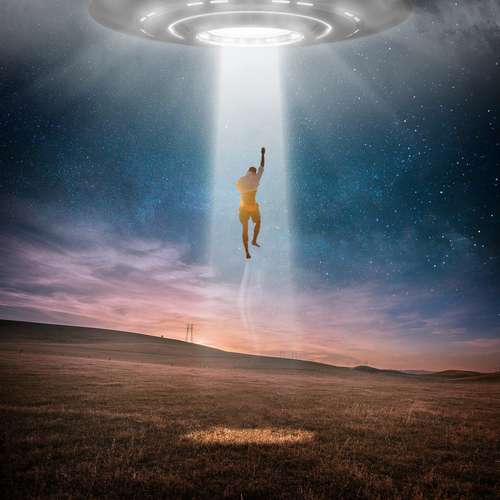
The Significance of Belief in UFOs
by Sylvia Engdahl
This essay was part of the series "The New Mythology the the Space Age" at my website, which consists of the material for the course on Science Fiction and Space Age Mythology that I taught online through Connected Education in the early nineties. I have made some minor revisions.*
Alongside the changing views of scientists and serious speculators toward extraterrestrials since the middle of the twentieth century, there has been an alternate belief among a growing segment of the public. The idea that Earth is being observed by UFOs, and/or was visited by extraterrestrial spacemen in ancient times, has become so prevalent that to many people--especially those who don't read either serious astronomy books or science fiction--it's a definitive part of the idea of alien civilizations. As far as Space Age mythology is concerned, the question of whether UFOs actually exist in our skies, and if so, whether they are of extraterrestrial origin, is irrelevant. What's significant is the fact that so many people believe they exist, and moreover, assume automatically that they are alien spaceships.
According to a 1978 Gallup poll, 57% of the American public believes UFOs are real. (The percentage dropped in later decades, but seems to be rising again.) By no means is the phenomenon predominantly American. Britain, with its small area, has the highest number of sighting reports in proportion to the rest of the world, in part because it has a large number of UFO researchers. There have also been accounts of sightings in France, Australia, Africa and the former Soviet Union, though they include no statistics. The interest in China has been especially strong; as of 1988 the Chinese Journal of UFO Research had developed a circulation of 325,000 copies--high in comparison to Western UFO magazines--with an estimated ten readers per copy, and there were hundreds of sightings in China that could not be explained during investigation.
Those unfamiliar with UFO material often confuse mere belief in UFOs with UFO cultism. Even social scientists have made this mistake, in part because scholarly literature has sometimes used the term "believer" to refer to cultists. But most UFO sightings have no connection whatsoever with cult followers. UFO cultism involves only a small minority of those who believe in the reality of UFOs; it is an occult phenomenon distinctly different from the widespread mythic view of our culture.

UFO cultists are not the same as people who have simply seen or encountered strange flying objects.
The cultists are convinced that they or their leaders are in telepathic contact with extraterrestrials, whether or not these leaders are self-proclaimed contactees. They are usually people who are, or have been, involved in other areas of the occult. Some have actually sold their belongings and waited for predicted mass pickups, just as other cults wait for the end of the world. Others sincerely believe that Jesus was an alien and the Star of Bethlehem was his ship. There have also been quite a few "channeled" books alleged to be aliens' advice to Earth. (Practically always, the ETs are perceived as "gods from outer space" whose aim is to save us from ourselves.) Most of these are not frauds. Channeling is a phenomenon not yet understood, which is becoming popular apart from UFOs; most likely it does not call for literal interpretation of the channeled material, but it is not faked. Its only connection to myth is that mythic metaphors usually do, as in this case, provide the basis for the ideas coming from, or through, the channel's unconscious mind.
During the past decade, there has been growing interest in "channeled" UFO material on the part of people who are not cultists, but who are adherents of "New Age" ideas. These ideas have been around for a very long time, and their current popularity is merely their latest manifestation, more public than past ones and therefore involving more people. It's part of what is sometimes called "the occult revival," but whereas past occultists believed themselves to be in contact with angels or departed spirits, they now often perceive their psychic contacts as extraterrestrials, in accordance with the mythic imagery most prevalent in our culture. There may well be real parapsychological phenomena underlying this form of occultism, as all others--such beliefs are not mere nonsense, however silly some of their adherents' literal interpretations may sound. At the very least, they deserve the same respect accorded other minority religious beliefs.
But occult psychic contact with aliens is not part of the mythic view held by most people who think UFOs are alien ships. The more common outlook is suspicion that our planet is being secretly visited, with or without the knowledge of our own governments--it is typified by the widespread belief in government cover-up of a 1947 UFO crash at Roswell, New Mexico. Furthermore, while both scientists and science fiction readers have traditionally scorned and ridiculed UFO cultism and its "New Age" sympathizers, there has been a growing overlap between the much larger categories of believers in UFO sightings and people who enjoy pop-culture science fiction.

The majority of reports of encounters with aliens describe them as grey with large hairless heads and small bodies.
This is not to say that science fiction has shaped UFO reports. Except for the alien invasion films of the 1950s, relevant films such as Close Encounters did not appear until after those reports were widespread. Furthermore, the people who make detailed sighting reports--and practically all who report actual contact--usually prove to be those who have had no previous interest in extraterrestrial life. Until mass-media science fiction became so prevalent that few in our society were unexposed to it, they were apt to be those who had not even seen such films. Some connections have been shown between obscure early science fiction and the imagery in contact reports, but rarely could it be established that the individual making the report had viewed any. On the whole, the more deeply a person is involved with UFO mythology, the less likely he or she is to be involved in science fiction mythology, and vice versa.
There is a reason for this, I believe. Space fiction appeals to people who are interested in the future and/or extraterrestrial life, but who do not feel a need to take the details of their mythology literally, however literally they may conceive of its basic framework. UFO mythology, on the other hand, is accepted as literally true in all its details. Both are responses to our culture's perception of the universe beyond our planet, but the nature of the unconscious process involved appears to be quite different. In the first place, UFO enthusiasts want to believe, rather than imagine. In the second place, unless we give credence to the idea that aliens are actually present here, we must suppose that reporters of details, as distinguished from mere lights in the sky, have different perceptions than the rest of us. The most impressive sighting reports, like the contact reports, are made by people who not only aren't SF fans, but who aren't UFO buffs either. It is almost as if their minds reject hypothetically-expressed metaphor and perceive it directly as if it were reality.
I must emphasize that I'm not saying that these people are mentally disturbed. Most of those examined by psychiatrists have, in fact, been found to be entirely healthy. The term "hallucination" is commonly used as if it indicated illness, but that is only because of our culture's aversion to the idea of altered states of consciousness. In more and more contexts, it's coming to be recognized that the human mind does perceive in ways unrelated to sensory input and that such perceptions may be indistinguishable, under certain conditions, from sensory ones. Ufology has yet to recognize this fact; by and large, the idea of "hallucinations" is associated with debunkers and therefore resisted. Those researchers who now believe that there can't be so many alien ships are turning to the idea of physical manifestations from other dimensions to account for what's being experienced. Personally, however, I find this much more far-fetched than the possibility that our minds are more complicated than we've realized.

This bestselling book popularized the idea that aliens came to Earth in ancent times.
The "alien abduction" phenomenon has forced researchers to take investigation of UFO contact reports more seriously. Before going on to that, however, mention should be made of the "ancient astronaut" myth, which was especially popular during the 1970s at the time Erich von Daniken's book Chariots of the Gods and its sequels appeared. This was the context in which the term "gods from outer space" originated. There are many people who don't think ETs are present now, yet believe they were here in the past, and were no less responsible for our evolution than the fictional monoliths of the film 2001. They maintain that aliens built ancient structures and taught ancient stargazers, on the basis of "evidence" that is rejected by all reputable anthropologists and archeologists.
Of course, we have no evidence that extraterrestrials did not come here. We do, however, have irrefutable evidence that they did not interbreed with our own species, as is often claimed. DNA data show an unbroken line of molecular evolution from early vertebrates to homo sapiens. In fact, the human genome is 99 percent identical to that of a chimpanzee, which could not be the case if we were crossbreeds. The idea of interbreeding is thus purely mythic, yet it's very persistent; why? Is it a mere reinterpretation of ancient creation myths, or myths of sex between humans and gods? Do we, perhaps, believe so strongly in the superiority of ETs that we'd rather be related to them than to animals? Or is it simply a metaphor for our hope that we won't find a universe full of strangers?
*
Until fairly recently, UFO experiences were of three kinds: sightings of unidentified flying objects, which were quite common; contact reports, which were rare and sometimes fraudulent, the sincere ones usually coming from people with some past involvement in the occult, or at any rate a desire to gain personal followers; and alleged government cover-ups. For these reasons, most educated observers did not take UFOs very seriously. I myself did not-- though I recognized them as an aspect of Space Age mythology, I dismissed the occultists' views as representative of too small a minority to be significant and the sightings as too lacking in detail. As for the government conspiracy theories, I found, and still find, them incredible--if the government can't conceal its scandals, how could it manage to conceal something as important as the existence of ETs?
But with the rise of the "alien abduction" phenomenon in the 1980s and 1990s, the situation changed. Now, thousands of people--statistical projection says millions--are having extremely detailed experiences they interpret as UFO contact, and that are definitely not faked. Most of them have no prior interest in UFOs, and, according to reputable psychiatrists, no symptoms of mental instability. Moreover, many are well-educated professionals. Thus, increasingly, it's being recognized that there must be some hitherto-obscure explanation. From the standpoint of a mythologist, the most significant aspect of this is that if and when we do uncover the explanation, we are likely to find that it covers not only Space Age mythology but mythology in general, including ancient mythology. I think we may well be on the verge of an entirely new theory of what myth is, how it arises, and how it is disseminated.
The first "UFO abduction" case was that of Betty and Barney Hill in 1961, which was for a long time quite exceptional, not just in its features but in the fact that the Hills could remember the experience only under hypnosis. But now, the pattern set by that case and others, such as the 1975 Travis Walton case (basis of the film Fire in the Sky) has become very common. Typically, abductees are taken by force aboard what they interpret as an alien ship and are examined medically, often painfully and usually with emphasis on organs of reproduction; women often report either the initiation or interruption of pregnancy. Physical marks and/or symptoms sometimes remain. Multiple encounters are common, and not only do many adults recall their initial occurrence in childhood, but children as young as two or three tell of being abducted. Such experiences are almost always terrifying, both while they are happening and later, when recalled spontaneously or through hypnosis. However, there are statistically significant instances of later positive personality change.
Basically, there are five categories of interpretation given to this phenomenon by investigators. (Abductees themselves, however, almost invariably interpret it at face value.)

Harvard psychiatrist John Mack determined that the abductees he examined were not insane or fraudulent.
* Debunkers hold that all such reports are either fakes or manifestations of psychosis. Neither interpretation can be valid in the vast majority of cases. Psychiatrist John Mack, a professor at Harvard Medical School, examined many abductees and, like other psychiatrists who have done so, stated not only that they are entirely sane, but that their memories are indistinguishable in all respects from memories of actual events. Though the debunkers have claimed that incompetent hypnotists ask leading questions and inadvertently implant false memories in the minds of abductees, surely this charge cannot be made against someone of Mack's professional standing. Why are they so blind to psychiatric findings? It can only be that their own psychological biases will not permit them to accept data that upsets their assumptions about reality.
* Others feel that physiological phenomena such as atypical electrical activity of the brain, either spontaneous or induced by external influences, can account for the subjective experiences reported by abductees. For example, laboratory experiments have shown that exposure to magnetic pulses can produce the sensation of floating, flying or leaving the body. However, this hypothesis cannot explain independent experiencers' near-identical descriptions of the aliens, their behavior, and even the instruments they use, which include details unobtainable from public media.
* The majority of ufologists, like the abductees themselves, hold that people are actually being abducted by aliens. However, as Jacques Vallee and others skeptical of this explanation point out, this would demand the presence of far too many alien ships to be conceivable, and furthermore, aliens would have much easier ways of getting samples of human genetic material. As for the experiments in crossbreeding which Budd Hopkins, historian David Jacobs and others are convinced have happened, again, there would be easier ways--a technology that could overcome the problems of crossing unrelated genomes (which is impossible according to biology as we know it) could do whatever was wanted by means of genetic engineering in the first place, without the necessity for getting genetic material from humans.
* Some researchers, notably Vallee and, more recently, Mack, believe that if UFOs aren't extraterrestrial, then the experience involves physical beings from another dimension; and that similar experiences have occurred through history, interpreted according to the mythology of their era--for example, abduction by fairies, or the appearance of angels or the Virgin Mary. They feel that the close similarities between abductees' accounts, involving details never reported in the media, point to a basis in objective reality. This view has the important advantage of providing a single explanation for facets of all mythologies. However, do we need to resort to the very debatable idea that other dimensions or "universes" exist in order to do this? Those who believe we do seem to be those who believe that physical results--such as marks on the body--demand physical explanations; however, our growing knowledge of mind-body medicine shows that this isn't necessarily the case.
* Speculators such as psychologist Kenneth Ring, scholar Michael Grosso and shamanic practitioner Terence McKenna believe that the abduction phenomenon is entirely psychic, involves the collective unconscious, and is a sign of evolutionary crisis (some of those in category 4 also consider it such a sign.) It should be noted that though the comparison isn't mentioned, this is essentially the view of the occultists, whose predecessors have believed for centuries that psychic contacts with spiritual entities of some kind guide human evolution. In fact, it is not too different from the view of people who believe literally in the voice of God. The tendency is to postulate external entities interacting with abductees' minds, if not spirits, then, for example, an "overmind" as suggested by Grosso and Ring.
It seems to me, however, that it is not necessary to do this. In my own view, ideas and even specific imagery may come directly from the collective unconscious through some process we would call "paranormal" but which, if it exists at all, is a fundamental aspect of human functioning. Ring's finding that some personality types are more prone to such experience than others certainly supports such a hypothesis. (How, after all, would ETs or beings from other dimensions pick people with particular personalities for physical contact?) It is evident, since the specific descriptions of the aliens have been traced to obscure science fiction that not all abductees could have seen, that "paranormal" communication of those images has to occur at one level or another; whatever brings about the experience, its interpretation must be at least partially derived from the collective unconscious. But of course, this raises the question of what the "collective unconscious" is. I don't think we can understand the "abduction" phenomenon until we find out.

The UFO abduction phenomenon may be a metaphoric expression of our culture's fear of the wider universe.
What is more productive for us to attempt, at this stage, is speculation about what the abduction phenomenon means. It's easy to see why adherents of Space Age mythology perceive godlike aliens offering us advice, such as those the contactee cults and channelers describe. But why terrifying aliens of the kind abductees encounter? These aliens aren't perceived as hostile to Earth or apt to invade it; usually they are cold and indifferent. Sometimes they do offer "information" about Earth's perils; more often, abductees later become increasingly concerned about those perils, such as environmental crises. But most people who develop such awareness don't get abducted by UFOs. Furthermore, the abductees shun publicity; they are not trying, even unconsciously, to command an audience. Why, if the phenomenon is a warning about danger to Earth as more and more are coming to believe, does it take the form of personal, rather than cultural, examination? And why don't people who've hoped to encounter ETs--as many of us have--ever have such experiences?
I do not know the answers to these questions. But I think, as far as I can determine without having access to the serious ufology journals not found in local libraries, that researchers have not been considering them in the light of Space Age mythology. They seem to either take them at face value as alien encounters, or try to answer them in terms having nothing to do with extraterrestrials. This, in my opinion, ignores the fact that most people other than researchers do believe UFOs are of extraterrestrial origin. I agree with much that Keith Thompson says in Angels and Aliens about their significance in terms of our developing perceptions, yet the form the phenomenon takes, as distinguished from the form taken by myths dealing with angels, is nevertheless its most outstanding facet. Any explanation of it, even one based on full knowledge of our mental processes, needs to tell us why the concept of aliens now has more power over us than other images of similar origin.
And so I speculate that the UFO abduction phenomenon is a metaphoric expression of our culture's fear of the wider universe, as distinguished from hopes expressed by most pop-culture science fiction and from wishes implicit in the "beneficent gods from outer space" myth. It seems to me to reflect not fear of our own destructiveness, as most commentators who don't take UFOs literally seem to think, but fear that we're indeed on the verge of contact with extraterrestrial environments, if not beings, and that when we face that test we will be found wanting.
The people who have these encounters are not those who look forward eagerly to exploring space. They are not Star Trek fans (and considering the rapid increase in both populations, it's surprising that there's not more overlap). I suspect that "abductees" are those who are open to new forms of consciousness, yet terrified at the mere idea of meeting something alien, so terrified that they perceive such contact as threatening to the very essence of physical humanity, their sexuality. The perception of genetic experimentation by aliens--and, often, of nurseries full of hybrid babies--is, perhaps, a mythic reaction to the fear that apart from Earth and our Earthly heritage we would no longer be fully human.
My personal view of the phenomenon
is that the metaphoric imagery associated with it, like that of all UFO
encounters, spreads throughout society by means of telepathy at an unconscious
level. The unconscious mind is a deep well from which people draw only such
concepts and images as fit their individual outlook--how could it be otherwise,
considering the vast amount of material that universal unconscious telepathy
would make available to human beings? The mind automatically filters that
material, and most of us are too absorbed in everyday reality to perceive metaphorically-based
experiences as real. But for people with a psychological need to validate their
fears--or in the case of those who encounter benevolent aliens, their
wishes--such experiences are a powerful means of coming to terms with them.
Copyright 1995, 2017 by Sylvia Engdahl
All rights reserved.
This essay is included in my ebook The Future of Being Human and Other Essays